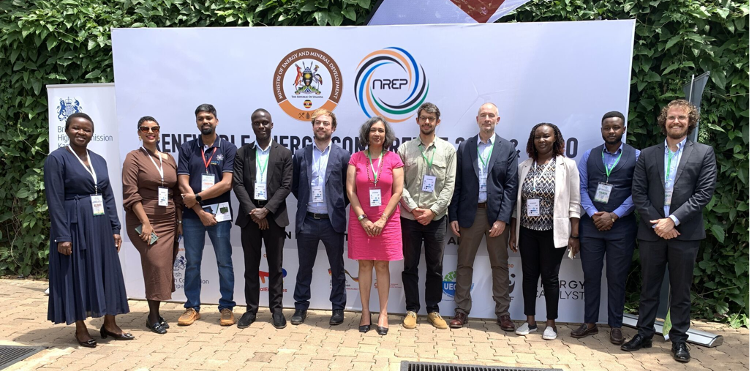Taking place in Kampala from 16th to 18th November 2023, the Renewable Energy Conference 2023 (REC23) gathered over 2000 stakeholders from across industry, government, development, academia and civil society to pool expertise and approaches to fostering renewable energy (RE) and energy efficiency adoption. Co-organized by the Ministry of Energy and Mineral Development (MEMD) and the National Renewable Energy platform (NREP), with a focus on sustainable and equitable development under the theme of “clean energy for all”, the conference provided Energy Catalyst companies with an excellent opportunity to showcase their projects, network with influential sector players and learn from fellow innovators. Project representatives arrived keen to discuss burning topics such as best practices, trends in innovation, and overcoming the challenges around scaling RE solutions and increasing energy efficiency adoption.

As well as manning an exhibition booth showcasing our projects, Energy Catalyst hosted two panel discussions on the first day in which ten supported projects shared insights from their project journeys. The crucial importance of securing financing to drive company growth emerged as a major theme of both sessions. Even though stakeholders across the RE ecosystem are passionate about the energy transition, our project developers emphasised the persistent difficulties faced by young companies around financing each stage of their growth trajectory, particularly due to high capital costs, under-developed business and financing models, and lack of proven creditworthiness. Potential financing solutions and ways to attract investors therefore generated lively debate during these sessions.
The panel for the first session ‘Bridging the funding gap to scale innovation and accelerate a clean energy transition in East Africa’ included Mandulis Energy, Aptech Africa, Smart Villages Research Group, Ecolife Foods and Solapak Development. Company executives shared their own pathways towards securing finance and highlighted the role that Energy Catalyst grants and technical support has played in accelerating their project development. Laura Cororan from Aptech Africa underscored the pivotal role of donors in helping projects achieve investor readiness: “Impact investors still need an ROI, which entails providing audited financials that show how they will receive their return. Tailored donor support plays a vital role in helping companies demonstrate the financial viability of their projects.”
Titled ‘Innovating for impact – raising finance’, the second panel featured E-Safiri, Innovex, OrxaGrid, International Institute of Tropical Agriculture (IITA) and Charm Impact. Discussion revolved around the need for more early-stage capital to ensure innovative solutions can springboard into financially viable businesses ready to scale. Whilst projects often find it relatively straightforward to access funding for the pilot stage, company representatives attested to the relative dearth of financing for the subsequent growth phase. When companies cannot yet prove the profitability and financial sustainability of their projects, supportive stakeholders are needed to come on board and help mitigate the risk adversity of traditional investors. Panellists also called out for governments to promote more innovator-friendly regulatory and tax environments that lower the cost of investment.
Outside of the Energy Catalyst panels, other sessions and side-events provided project leaders with thought-provoking insights into the trends and forces shaping the renewable energy sector. Many of them testified that productive use of energy (PUE) emerged as the most hotly debated topic of the conference, with many players highlighting the urgent need to address product affordability and inadequate distribution networks to improve adoption of renewable energy solutions in rural areas. Other sessions underscored the difficulties of galvanising customer behaviour change and the need to invest greater time and money in community-based awareness-raising initiatives around the benefits of RE products and services. Our project leaders were also pleased to see the large contingent of primary and secondary school pupils in attendance on the first day of the conference. If the future of energy in Africa is renewable, it is crucial to embed awareness and training of these technologies within the educational system, particularly as a means to prepare the future workforce.
Keen to meet fellow innovators, financiers and development players, Energy Catalyst companies also capitalised on networking opportunities, with, many reporting making valuable connections. For example, Aarti Shah from IITA took the opportunity to network with MEMD representatives from the Uganda government, sharing information on gasification and discussing areas of mutual interest. They also had the opportunity to discuss best practices with other innovators developing comparable technologies. On the final day, representatives from our mini-grid projects were particularly interested in the major announcement of a tender programme for solar-powered mini-grids from Get Access Uganda, with funds of EUR35million available.
Summarising his takeaways from the conference, Energy Catalyst consultant Thomas Petex, who co-led the delegation, said he particularly appreciated the pragmatic approach to building renewable energy capacity and markets. According to Thomas, “Renewable energy should not be regarded as miracle solution that can immediately transform the socio-economic landscape of developing countries such as Uganda, as there are manifold business and operational challenges to overcome. It is imperative that renewable energy companies can first prove viable business models based on customer-friendly and accessible payment methods, plus more effectively build awareness in rural communities. Change will initially be relatively small-scale, largely based on replacing diesel generators with modest renewable energy units, and the sector will then be in a position to scale from there. But ensuring access to finance – for both companies and customers – will be an indispensable part of making that happen.”